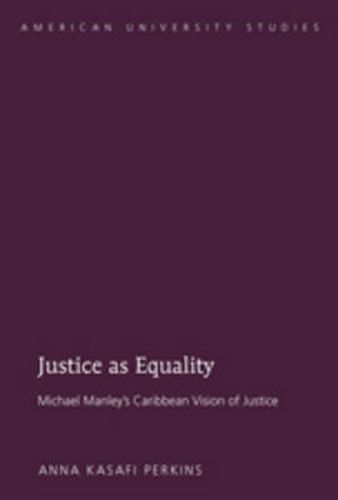Readings Newsletter
Become a Readings Member to make your shopping experience even easier.
Sign in or sign up for free!
You’re not far away from qualifying for FREE standard shipping within Australia
You’ve qualified for FREE standard shipping within Australia
The cart is loading…






This title is printed to order. This book may have been self-published. If so, we cannot guarantee the quality of the content. In the main most books will have gone through the editing process however some may not. We therefore suggest that you be aware of this before ordering this book. If in doubt check either the author or publisher’s details as we are unable to accept any returns unless they are faulty. Please contact us if you have any questions.
Justice as Equality makes a unique contribution to the philosophical and intellectual tradition of the English-speaking Caribbean by exploring the theory of justice underpinning the life, work, and writings of former Prime Minister of Jamaica and renowned Third World Statesman the late Michael Manley (1924-1997). Manley’s singular Caribbean vision of justice was forged in a post-colonial context that he described as being too radically disfigured by inequalities to be improved by mere tinkering . This book posits that equality has become unfashionable in social analysis and contemporary politics, in part due to the increased significance of values such as identity, diversity, and difference, in tandem with a misunderstanding of the concept of equality. It argues for a reclaiming of a multi-faceted and complex way of understanding equality in light of Manley’s thought. Through an engagement with the norms of justice developed within the Catholic social teaching tradition, this book examines, clarifies, and deepens Manley’s Caribbean account of justice as equality . Manley’s theory is a deeply relational theory one of justice and equality that roots fundamental human equality in the relationship to divine transcendence. It calls for the dismantling of all relationships of oppression and domination that result when the fundamental equality of all human beings is disregarded. It takes account of the multiple dimensions of the human person, and calls a society ‘just’ when it allows for the flourishing of every member, specifically through full participation in the life of the society.
$9.00 standard shipping within Australia
FREE standard shipping within Australia for orders over $100.00
Express & International shipping calculated at checkout
This title is printed to order. This book may have been self-published. If so, we cannot guarantee the quality of the content. In the main most books will have gone through the editing process however some may not. We therefore suggest that you be aware of this before ordering this book. If in doubt check either the author or publisher’s details as we are unable to accept any returns unless they are faulty. Please contact us if you have any questions.
Justice as Equality makes a unique contribution to the philosophical and intellectual tradition of the English-speaking Caribbean by exploring the theory of justice underpinning the life, work, and writings of former Prime Minister of Jamaica and renowned Third World Statesman the late Michael Manley (1924-1997). Manley’s singular Caribbean vision of justice was forged in a post-colonial context that he described as being too radically disfigured by inequalities to be improved by mere tinkering . This book posits that equality has become unfashionable in social analysis and contemporary politics, in part due to the increased significance of values such as identity, diversity, and difference, in tandem with a misunderstanding of the concept of equality. It argues for a reclaiming of a multi-faceted and complex way of understanding equality in light of Manley’s thought. Through an engagement with the norms of justice developed within the Catholic social teaching tradition, this book examines, clarifies, and deepens Manley’s Caribbean account of justice as equality . Manley’s theory is a deeply relational theory one of justice and equality that roots fundamental human equality in the relationship to divine transcendence. It calls for the dismantling of all relationships of oppression and domination that result when the fundamental equality of all human beings is disregarded. It takes account of the multiple dimensions of the human person, and calls a society ‘just’ when it allows for the flourishing of every member, specifically through full participation in the life of the society.